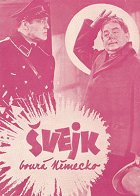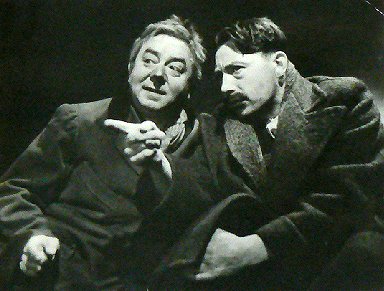Plots(1)
There are at least two ways in which Karel Lamač's British "Švejk" is really unique. First, it celebrates the Czech resistance fight using the combination of the Czech tradition of episodic storytelling and British spy-film genre formulas. And second, using this fresh perspective he "updates" the plot of Jaroslav Hašek's classic book. (Summer Film School)
(more)Reviews (2)
Karel Lamač, a jack of all trades, was, among other things, the founder of the tradition of adaptations of Schweik's adventures. He made the first two films of a four-part series from 1926 to 1927. There was thus no better author who could have brought Schweik into the modern struggle against Nazism. This film is a great comedy. Jan Masaryk has the opening speech and the story takes place in 1941 and begins in Prague. Schweik still lives with Mrs. Müller and, besides picking up various stolen goods, he is engaged in anti-Nazi resistance. He does so again, preferably at an inn, and we also get a sympathetic reminiscence thanks to the scene with Palivec and his careless handling of the leader's painting. Indeed, Schweik goes on to be imprisoned as a secret agent because he believes Dr. Goebbels' speech that 1941 was the end of the war, and with the stroke of New Year's Eve he breaks the blackout and celebrates peace. He then becomes a servant of the Gestapo boss and Mrs. Gestapo, at that time a theater artist. All this is saturated with plenty of perfect catchphrases and gags. The pace of the narrative doesn't lose steam even as Schweik travels with the suspended boss on a train and we liberate a train bound for a concentration camp. And it wouldn't be Schweik if he hadn't become a paratrooper thanks to a tarp from a milk wagon... The basic skeleton of the story thus remains the same, but it underwent Lamač's rejuvenation (Lamač was not only the director but also the co-writer and the author of the fabulous score), which was done to perfection.
()
“I'm going with the Gestapo boss to Lublin. You know that I will be incognito!" A very good comedy and I believe that it entertained the British, because Schweik is almost a universal character and that fact that he is a cunning resistance fighter playing an idiot wasn't lost on anybody. Karel Lamač certainly saw to it that everything was just right in the story - Hašek, Czechness, Britishness... The final scene with the presumptive Russian paratrooper in the sail of the United Dairy (and especially his interrogation) has everything in it, and not even 'Allo 'Allo! could be ashamed of it.
()


Ads